In 2024, understanding workplace trends is vital for shaping career development and maintaining job security amidst technological advancements. This blog will explore the dynamic employment landscape influenced by AI, which is rapidly redefining job roles and necessary skills. We will discuss emerging career opportunities, strategies for professionals to remain relevant, and the significant impact of digital transformation on work environments. We will also review insights into the fastest-growing job sectors and the importance of inclusive employment practices. By grasping these trends, professionals and organizations can prepare for an adaptable and growth-oriented future.
In this blog, you will find:
🍃 Adapting to the New Employment Ecosystem
Career Trends 2024
Work, workplace, and workers are the primary focus of future workplace trends. Now, more than ever, leaders see that investing in their talent is as important as investing in other aspects of their business. Future of Jobs Report suggests that by 2027, 44% of core skills will be disrupted because of AI.
The fastest-growing job outlook is in the healthcare sector. Here are the top 5:
-
Nurse Practitioners 👩⚕️
-
Wind Turbine Technicians 🌬️
-
Data Scientists 📊
-
Statisticians 📉
-
Information Security Analysts 🔒
The world of work is changing fast. Here are 6 workplace trends for 2024:
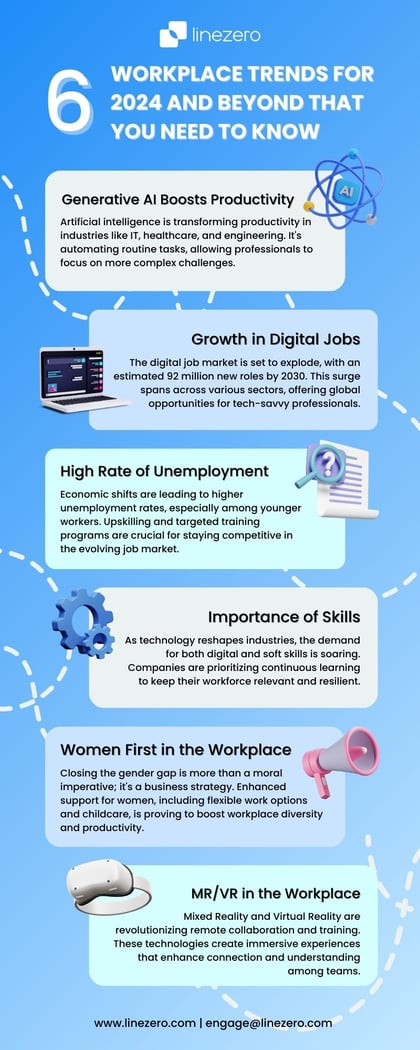
1. Generative AI Boosts Productivity:
Productivity boosts will largely occur in knowledge industries like IT and digital marketing, along with healthcare, engineering, manufacturing, and energy sectors. This will largely occur in high-income countries, whereas most developing countries will not feel a large positive impact.
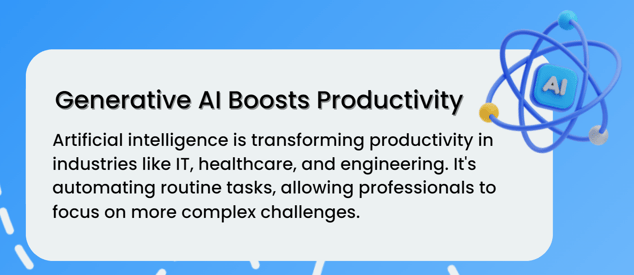
2. Growth in Digital Jobs
According to the World Economic Forum(WEF) 's paper "The Rise of Global Digital Jobs", approximately 92 million digital jobs are projected to be available globally by 2030. This surge in digital employment presents exciting opportunities for economic growth and a more expansive talent pool across diverse industries. As organizations embrace remote work and digital tools, individuals from different backgrounds and regions can contribute to the global workforce, fostering innovation and collaboration.
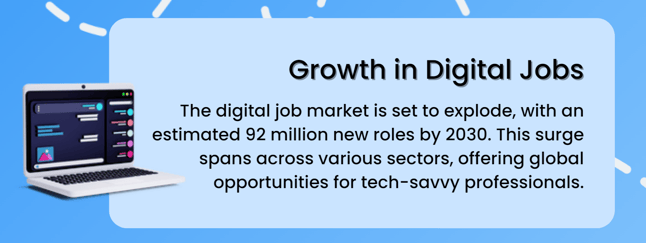
3. High Rate of Unemployment
In January 2024, workplaces have seen greater layoffs and lower opportunities for youngsters. Upskilling and retraining are vital to adapt to the changing job market by enhancing skills through training programs and online courses. These initiatives not only boost employability but also ensure that the workforce remains competitive in a digital economy.
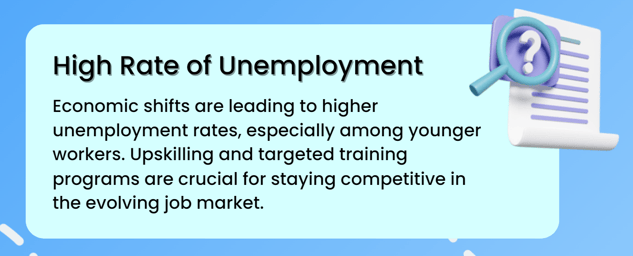
4. The Importance of Skills
CEOs are now focusing on transferable skills and the potential of AI to personalize learning and upskilling for everyone. Employees who are proficient in digital tools and AI are more likely to excel. Companies are investing in training that helps everyone, from newcomers to seasoned professionals, enhance these critical skills, keeping their teams ahead of the curve.
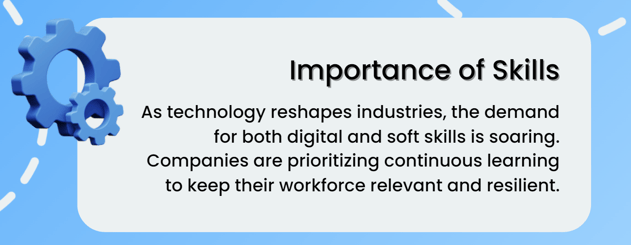
5. Women First
Inclusive workforces will benefit the economy financially and closing the gender gaps in employment is a rising career trend. Employers are offering more childcare and support programs to women for greater work-life balance and lower job attrition. These efforts help close the gender gap and reduce staff turnover, making companies stronger and more diverse. Creating workplaces that support women isn’t just good ethics—it’s good business.
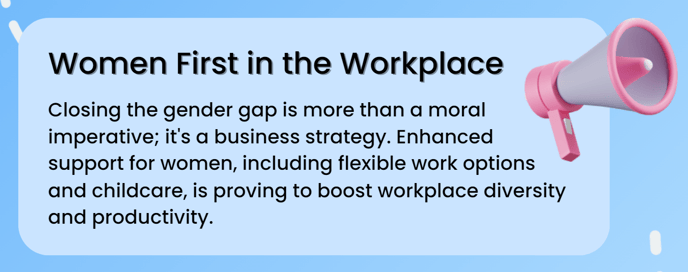
AI is causing big changes, but other things like going green and how countries do business will also change jobs. According to WEF, by 2027, about a quarter of jobs could be drastically different. Experts worry about fewer jobs in the future. Tech skills like computer programming and network engineering will be the most sought-after skills, followed closely by soft skills such as problem-solving and project management.
6. the future of MR/VR at work
Looking ahead, Mixed Reality (MR) and Virtual Reality (VR) are set to transform how we work. These technologies can make remote training and meetings much more interactive, almost as if you're in the same room with colleagues.
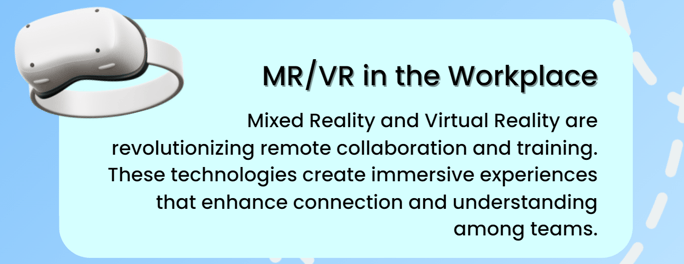
Companies like Meta are at the forefront of this transformation, developing ways to integrate MR and VR into our work lives. Embracing MR technology enhances social presence during virtual meetings, making participants feel more engaged, included, and connected to their company. Additionally, virtual gatherings can significantly reduce travel-related carbon emissions and the productivity losses often associated with employee downtime. MR technology also enables remote town halls, events, and employee onboarding, ensuring a consistent and inclusive experience for all participants. With Meta’s technology partners experienced in crafting MR solutions, deeper connections within the workforce are becoming a reality. This evolution in MR and VR could mean less travel, lower costs, and better teamwork for businesses worldwide.

Adapting to the New Employment Ecosystem
The way people work is changing fast because of technology, who's working, and what people value. These changes affect individuals, groups, and communities. To deal with these changes, it's important to understand what's happening and how to adjust to stay successful.
🤖 Technology and Automation
Machines and smart technology like robots are changing how work gets done. Some jobs might disappear, but new kinds of opportunities are opening up. Jobs that need thinking, problem-solving, and creativity are becoming more important. As automation takes over repetitive tasks, employees are free to focus on higher-level functions. This transition emphasizes the need for skill development in critical thinking and creativity, transforming job roles to be more strategic and innovative where human insight is irreplaceable.
💻 The Gig Economy
More people are doing short-term jobs or freelance work instead of having one long-term job. This is because people want flexibility and to work on their terms. It's good for some because they can choose when and where to work, but it can also be hard because there's less job security and fewer employee benefits available to them. In response, there is a growing trend towards creating support systems for gig workers, including platforms that offer benefits traditionally reserved for full-time employment and communities that provide networking opportunities and professional development tailored to freelance needs.
🌉 The Skills Gap
The skills people need for work are changing, too. Employers want skills that many workers don't have yet, especially in technology and understanding digital fluency. To be successful in the future, it's important to learn many skills, not just technical ones, including how to communicate and work with others. This necessitates a shift in education and training programs to include soft skills like communication, teamwork, and problem-solving alongside technical expertise. Companies are also recognizing the value of lifelong learning and are investing in continuous education and development programs to bridge this gap.
👭 Changing Demographics
The types of people working are changing too. As older workers retire, younger generations and people from divergent backgrounds are being hired. This is good because it brings fresh ideas and new ways of working, but it can also create challenges to manage teams with different generations and backgrounds. Organizations are increasingly focusing on diversity and inclusion initiatives to leverage the wide range of perspectives and experiences that a diverse workforce brings. This shift helps to drive innovation and improve decision-making processes within companies.
👨💻 Skill Development - Staying Relevant
In this era of technology, staying updated with digital skills is the most valuable currency. Whether you want to work in data analysis, coding, or digital marketing, proficiency of technical skills is paramount for job seekers. With platforms like Coursera and edX, these skills are easily accessible, and individuals can upskill from the comfort of their homes. Moreover, the demand for digital literacy extends beyond the tech industry, as nearly every sector now relies on digital technologies. Therefore, staying relevant means continuously adapting to new tools and technologies, making lifelong learning a critical component of career success.
.png?width=2000&height=513&name=Corporate-metaverse%20(1).png)
Conclusion - Embracing the Future of Work
As we explore the sweeping changes across the employment landscape in 2024, it's clear that the future of work is being reshaped by powerful forces, including technological advancements, evolving demographics, and shifting societal values. From the rise of digital jobs to the transformation brought about by MR and VR technologies, the way we work, collaborate and connect is undergoing a revolution. The insights shared in this blog underscore the importance of proactive adaptation and continuous learning to harness these trends effectively. Organizations and individuals alike must embrace new technologies, foster inclusive workplaces, and prioritize skill development to thrive in this dynamic environment. By staying ahead of these trends, we can not only anticipate the challenges but also seize the opportunities that lie ahead, ensuring a resilient and prosperous future for all. As we continue to navigate these changes, let's remain committed to innovation, inclusivity, and lifelong learning as the cornerstones of success in the ever-evolving world of work.
Are you ready to be part of the future of work?
The future of work is with LineZero!
At LineZero, we partner with Meta to empower businesses like yours through cutting-edge mixed reality (MR) and virtual reality (VR) solutions, tailored for today’s digital workplace.
Start Your Digital Transformation Journey Today!

April 18, 2024




Comments